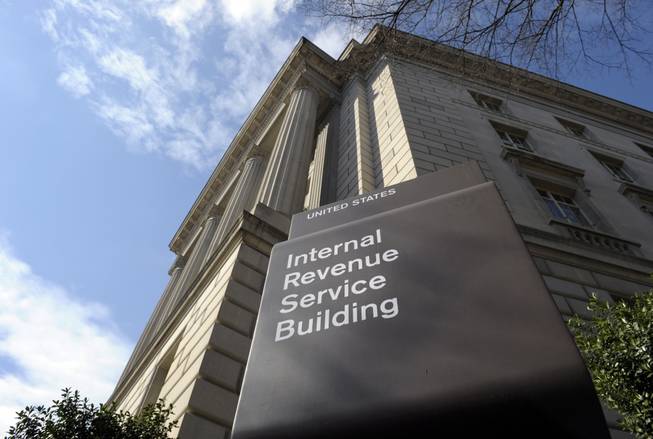
AP Photo/Susan Walsh
This photo taken March 22, 2013 shows the exterior of the Internal Revenue Service building in Washington.
Thursday, July 9, 2015 | 2 a.m.
The Las Vegas woman was on her way to work when she received a disturbing phone call from an unknown number.
“The IRS knows that you have not been paying your taxes for the past five years,” the man on the other end said.
“How can this be? I pay my taxes every year,” she said, her voice beginning to crack.
“There’s nothing you can do now.” The man’s voice became stern. “Your bank account will be frozen within the next 10 minutes and the police are on their way to arrest you right now.”
That’s what it's like to be the target of a scammer masquerading as an Internal Revenue Service agent.
Criminals are calling thousands people across the country, threatening to arrest them or even have them deported if they don’t pay up.
The Federal Trade Commission says the issue has gotten worse over the years. Last year they received almost 55,000 complaints, nearly 25 times more than in 2013.
In Nevada the FTC received 644 complaints from consumers saying someone had called pretending to be from the IRS in 2014. And that may not even reflect the full extent of the problem.
“Certainly there are consumers who do not complain because they haven’t fallen for the scam or they just may not realize that they should call the FTC,” said FTC spokesman Jay Spokesfield.
So far this year there have been about 350 consumer complaints from Nevadans, according to the FTC. Spokesfield said that number is tiny compared to national statistics, but has increased over the past year at a stunning rate.
It is difficult for local authorities to catch these scammers because they are commonly from out of the country and use disposable phones.
But there are a few things you should know to avoid becoming a victim:
1. Scammers do their research
These imposters are likely to know a lot about you, such as where you work, the last four digits of your Social Security number and even details about your loved ones.
2. They might seem legitimate
Their phone calls might show up as the IRS on your caller ID and they sometimes recite an identification badge number. But don’t be fooled:
3. The IRS won’t call you
The most obvious hint that you are getting scammed is the initial phone call itself. The IRS’ first contact will be through mail, not a phone call or email.
4. Urgency = fraud
Scammers will urge you to make an immediate payment on a prepaid or debit card.
If you get a call, here’s what you should do, according to the IRS:
1. Never give callers your personal or financial information.
2. Write down details about the caller, including their name and phone number.
3. Hang up if they call you. Don’t call back if they leave you a message. If they continue to call, block the phone number.
4. Report the call and file a complaint with the Treasury Inspector General for Tax Administration or the Federal Trade Commission.

Join the Discussion:
Check this out for a full explanation of our conversion to the LiveFyre commenting system and instructions on how to sign up for an account.
Full comments policy